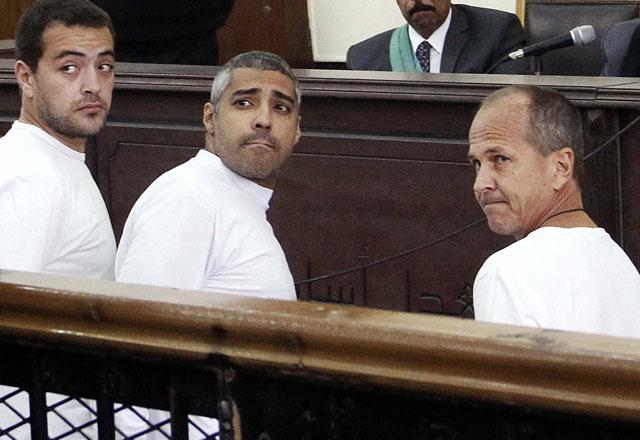You are here
Sisi sends signal to Egypt courts over jailed reporters
By AFP - Jul 07,2014 - Last updated at Jul 07,2014

CAIRO — Egyptian President Abdel Fattah Al Sisi’s stated regret over the trial that imprisoned Al Jazeera journalists was a strong signal to a judiciary whose harsh rulings have prompted international outrage, analysts said.
Sisi, who had previously said it would be inappropriate to remark on court rulings, conceded on Sunday that the lengthy prison sentences in June for the three reporters, including Australian Peter Greste, had had a “negative effect”.
The former army general told Egyptian newspaper editors during a roundtable that he wished the reporters had been deported after their arrest, rather than put on trial.
The three journalists were sentenced to between seven and 10 years for allegedly defaming Egypt and aiding the now blacklisted Muslim Brotherhood movement of president Mohamed Morsi whom Sisi removed from power last year when he was army chief.
Qatar, where Al Jazeera is based, has backed the Brotherhood.
Sisi’s remarks reflected growing dismay within the ruling establishment at a string of court rulings, including mass death sentences of opposition Islamists, that repeatedly shocked the international community, analysts and officials said.
“Sisi’s comments were obviously a positive sign that he understands the damage this has done to Egypt’s reputation,” one Western diplomat told AFP, referring to the Al-Jazeera trial.
Sisi’s remarks “hopefully will serve as a clear signal to the judiciary that the appeals process needs to be completed quickly and in favour of release of the journalists involved”.
His office has said that Sisi, who won a presidential election in May, cannot intervene to pardon the reporters until the appeals process is completed.
The army’s ousting of Morsi in July last year unleashed a deadly crackdown on the Islamists, with thousands also arrested and hundreds sentenced to death or prison in often swift trials.
Harsh and outlandish verdicts
The government insists that it does not interfere with the courts and that their rulings must be respected. But privately, officials have expressed consternation at the sometimes harsh and outlandish verdicts.
In one case, a court handed initial death sentences to almost 700 Islamists over deadly rioting.
The Islamists, the court explained in its ruling, were “demons” who used mosques to promote “their holy book, the Talmud”, a key text in Judaism.
In the trial of the Al-Jazeera journalists, the prosecution presented such evidence as they could gather from the defendants’ laptops. This included a picture of Greste’s parents and footage of a horse in a stable.
Their sentencing came a day after US Secretary of State John Kerry, seen as Cairo’s best friend in Washington, paid the newly elected Sisi a visit in a show of support.
The day before Kerry arrived, another court sentenced 183 Islamists to death. The timing of both verdicts was seen as deeply embarrassing for Washington’s top diplomat.
Kerry, who in Cairo announced the resumption of aid suspended after Morsi’s overthrow, called the imprisonment of the reporters “chilling and draconian”.
“There is some degree of alarm in the Egyptian establishment at some of the rulings in recent weeks,” said Issandr El Amrani, the North Africa Project director for the International Crisis Group think tank.
The rulings “have had diplomatic consequences like the Jazeera trial or death sentences and were an embarrassment in US-Egypt relations”, he said.
Even supporters of Sisi’s ouster of the Brotherhood have voiced dismay about the court rulings.
“The independence of the judiciary we all defend does not mean it should work in an isolated island, with no connection to consequences” wrote influential television host Lamees Al Hadidi in one newspaper.
Related Articles
Egypt’s president said Tuesday the authorities will not interfere in the judiciary, as protests were staged worldwide in solidarity with Al Jazeera journalists, including an Australian, whose jailing has sparked outrage.
An Egyptian court said it ordered a retrial of Al-Jazeera journalists due to a lack of evidence showing their alleged links to the blacklisted Muslim Brotherhood, state media reported Monday.
Egypt’s state news agency says that the trial of three Al Jazeera English journalists and 17 other defendants on terrorism charges has been adjourned until March 24.


















